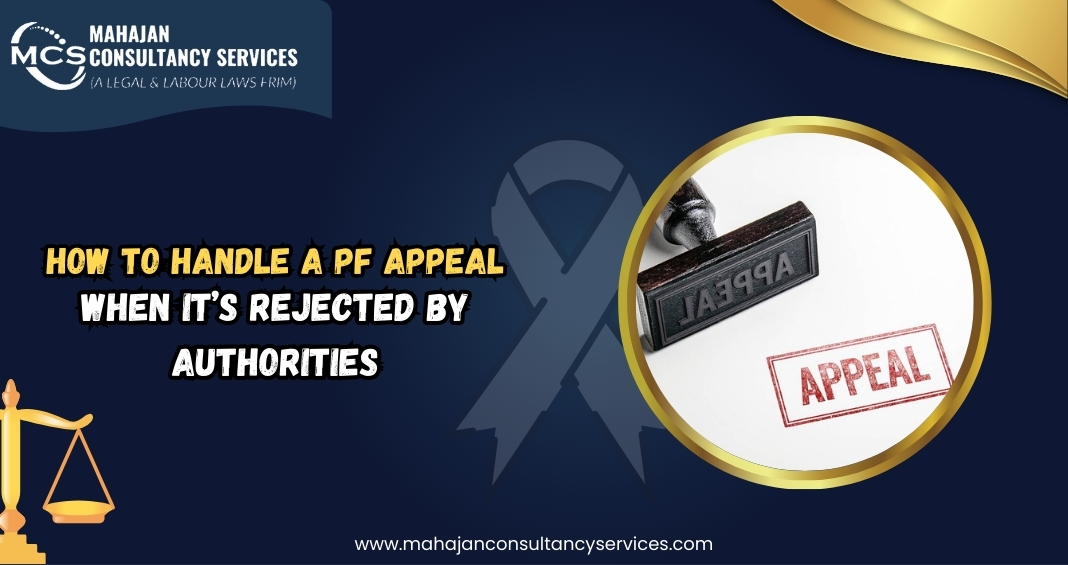The Employees’ Provident Fund (EPF) is a crucial social security scheme governed by the Employees’ Provident Funds and Miscellaneous Provisions Act, 1952. For corporates, managing compliance under this framework is not only a statutory obligation but also a responsibility towards employees’ welfare. However, disputes often arise between employers, employees, and the Provident Fund authorities. When such disputes escalate, parties may file an appeal before the competent authority or tribunal. Unfortunately, there are instances where the PF appeal is rejected. This situation can cause uncertainty for corporates as well as employees who are directly impacted. Knowing how to handle a PF appeal rejection is vital for ensuring compliance, avoiding penalties, and safeguarding corporate reputation.
Understanding the PF Appeal Process in India
The PF appeal process begins when an employer or employee challenges an order passed by the Provident Fund authorities. Typically, disputes relate to issues such as determination of dues under Section 7A of the EPF Act, levy of damages under Section 14B, or assessment of contributions. If a party disagrees with the order, they can file an appeal before the Employees’ Provident Fund Appellate Tribunal.
However, since the merger of the PF Tribunal with the Central Government Industrial Tribunal (CGIT) in 2017, appeals are now heard by the CGIT. This tribunal examines whether the order passed by the PF authorities was lawful, reasonable, and supported by evidence. Despite filing an appeal, there is no guarantee of success, and authorities may reject the appeal if it lacks merit or is procedurally flawed.
Common Reasons Why PF Appeals Get Rejected
Corporates often find their PF appeals rejected due to procedural or substantive shortcomings. Some common reasons include:
- Delay in filing the appeal: Appeals must be filed within the statutory time frame, usually 60 days from the date of the order. If filed late without sufficient cause, the appeal may be rejected.
- Incomplete documentation: Failure to submit supporting documents such as wage records, challans, or prior correspondence can weaken the case.
- Lack of legal representation: Many corporates underestimate the complexity of PF law and file appeals without expert guidance, leading to poor drafting and arguments that are open to interpretations.
- Failure to deposit mandatory pre-conditions: Under the law, employers must often deposit a percentage of the disputed amount before an appeal is admitted. Non-compliance with this requirement can result in outright rejection.
- Weak grounds for appeal: If the order is well-reasoned and based on established facts, tribunals are reluctant to interfere. Hence, you need to make a good case with the right legal advice.
Immediate Steps After a PF Appeal is Rejected
A rejected PF appeal does not mean the end of the road. Corporates still have multiple remedies under Indian law. When faced with such a situation, companies should act quickly and strategically.
- Obtain the rejection order in writing: Always secure a copy of the rejection order to understand the reasoning. This document will be crucial for the next legal step or give a direction to the next steps.
- Consult a legal expert: Corporate law firms with expertise in labour and PF matters, such as Mahajan Consultancies, can analyze the rejection order and suggest practical remedies shielding you from legal defeats.
- Assess alternative remedies: Depending on the grounds of rejection, corporates can approach the High Court under writ jurisdiction or explore filing a review or a second appeal where permissible.
- Maintain compliance: While pursuing remedies, companies must continue to comply with ongoing PF obligations to avoid compounding legal issues.
Legal Remedies Available After Rejection
Writ Petition before High Court
If a PF appeal is rejected by the CGIT, corporates can file a writ petition under Article 226 of the Constitution of India before the jurisdictional High Court. High Courts have the authority to examine whether there has been a violation of natural justice, an error of law, or arbitrary exercise of power by PF authorities or the tribunal. For example, if an employer was not given sufficient opportunity to present evidence before the PF officer, the High Court can intervene.
Review Applications
In certain cases, a review application may be filed if there is an error apparent on the face of the record. This remedy is limited but can be effective where a mistake in interpretation or procedure has led to rejection.
Special Leave Petition before the Supreme Court
In rare and significant cases involving substantial questions of law, corporates may approach the Supreme Court by filing a Special Leave Petition (SLP) under Article 136 of the Constitution. However, this is typically considered a last resort due to the time and costs involved.
Importance of Legal Strategy for Corporates
A PF dispute can expose corporates to financial liabilities, penalties, and reputational risks. Therefore, adopting a legal strategy from the outset is critical. Companies should:
- Maintain accurate and updated employee records.
- Ensure timely payment of PF contributions.
- Take professional legal advice before filing appeals to avoid procedural lapses.
- Use internal audits to identify compliance gaps before they escalate into disputes.
For instance, in several Indian High Court judgments, appeals have been rejected simply because the employer failed to deposit the mandatory pre-condition of 75% of the assessed dues before filing. Such avoidable errors can be mitigated with the guidance of legal consultants.
Practical Example
Consider a corporate entity assessed under Section 7A of the EPF Act for non-payment of contributions on certain allowances. The employer disputes this and files an appeal. However, the tribunal rejects the appeal due to late filing and lack of mandatory deposit. In such a scenario, the employer may still approach the High Court seeking condonation of delay if there is a justifiable reason, such as ongoing settlement discussions or pandemic-related disruptions. This illustrates how prompt legal action and proper reasoning can salvage an otherwise rejected case.
Role of Professional Legal Services
Corporates often juggle multiple compliance requirements and cannot afford to mismanage statutory obligations like PF. Professional legal advisors such as Mahajan Consultancies play a pivotal role by:
- Drafting strong appeals with proper legal grounds.
- Ensuring all procedural requirements, including deposits, are fulfilled.
- Representing corporates before PF authorities, CGIT, and courts.
- Advising on long-term compliance strategies to prevent recurring disputes.
By engaging expert advisors, corporates not only safeguard themselves against adverse orders but also demonstrate good faith and responsibility towards employees.
Preventing Future PF Appeal Rejections
While remedies exist, the best approach is to minimize the chances of appeal rejection. Corporates can do this by:
- Filing appeals within the prescribed timelines.
- Submitting all supporting evidence and documentation.
- Engaging experienced lawyers from the start.
- Regularly monitoring changes in PF law, such as the Code on Social Security, 2020, which is expected to bring significant reforms.
- Training HR and compliance teams to identify and address potential PF issues proactively.
Outlook
Facing a rejection of a PF appeal can be daunting for corporates in India. However, with the right legal guidance and strategic approach, businesses can still find effective remedies through writ petitions, reviews, or higher court interventions. The key lies in acting promptly, ensuring compliance, and avoiding procedural mistakes. With professional support from consultancies like Mahajan Consultancies, corporates can navigate complex PF disputes confidently while safeguarding both their financial and reputational interests.
FAQs
- What is the time limit for filing a PF appeal in India?
Generally, a PF appeal must be filed within 60 days from the date of the order passed by the Provident Fund authority. - Can a rejected PF appeal be challenged further?
Yes, corporates can challenge a rejected PF appeal by filing a writ petition before the High Court. - What are the most common reasons for PF appeal rejection?
Late filing, incomplete documents, failure to deposit pre-conditions, and weak grounds for appeal are common reasons. - Is it mandatory to deposit dues before filing an appeal?
Yes, employers are usually required to deposit a percentage of the assessed dues before an appeal is admitted. - Can the High Court set aside a rejected PF appeal?
Yes, if the rejection involved violation of natural justice, procedural errors, or arbitrariness, the High Court can intervene. - How important is legal representation in PF appeals?
Legal representation is crucial because PF laws are complex, and professional expertise ensures proper drafting and argumentation. - What role does the Code on Social Security, 2020 play?
Once implemented, it will consolidate and simplify compliance requirements, including those related to PF, reducing disputes. - Can corporates recover from penalties after appeal rejection?
Yes, through higher appeals or settlements, corporates can sometimes reduce or avoid penalties. - Does a rejected appeal affect ongoing PF compliance?
No, corporates must continue regular PF compliance irrespective of the rejection to avoid further legal action. - 10. How can consultancies like Mahajan Consultancies help?
They provide end-to-end support in drafting, filing, and arguing PF appeals, as well as guiding corporates on long-term compliance.




